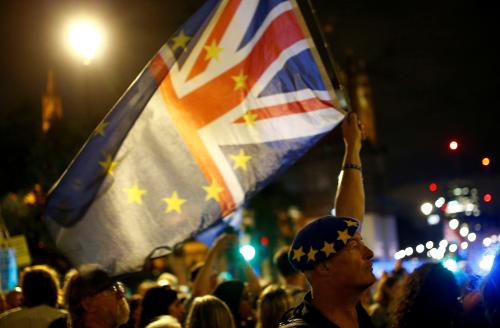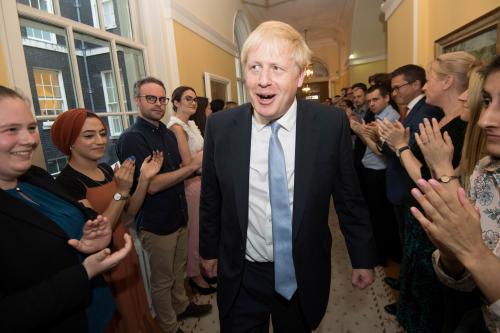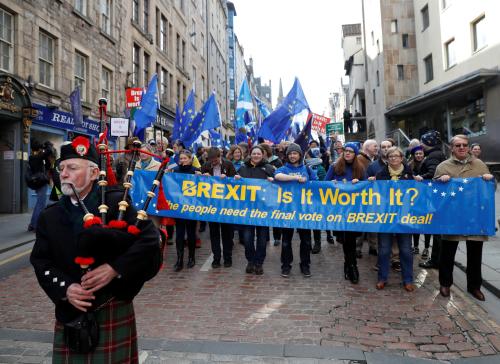Two months before the Brexit deadline, the new British Prime Minister Boris Johnson has dramatically escalated the political tension by suspending Parliament. Although Johnson defends this move as routine, critics accuse him of limiting time for legislators to prevent the United Kingdom from crashing out of the European Union on October 31 with no deal. Amid claims of a constitutional crisis, odds have increased for fall elections and a no-deal Brexit.
What does it mean to prorogue parliament?
On August 28, Johnson obtained Queen Elizabeth II’s approval to prorogue — a fancy word for suspend — Parliament. This is a standard procedure, enabling the government to end one legislative session and launch a new one. (In the U.S. Congress, this happens every two years after elections.) Most parliamentary sessions last for a year; the current one, which began after June 2017 elections, has been the longest in almost 400 years. New sessions are launched by the Queen’s speech, which sets out the government’s policy proposals. Having replaced Theresa May in July, Johnson told members he wants to “bring forward a new bold and ambitious domestic legislative agenda for the renewal of our country after Brexit.”
Parliament returns from its summer recess on September 3. It was expected to break for three weeks in late September and early October for political parties to hold their annual conferences, although some members proposed cancelling this break to focus on Brexit. Johnson now plans to suspend Parliament around September 9-12 and re-open it on October 14.
The length, timing, and perceived intent of the suspension have provoked an outcry in London and beyond. Suspensions normally last for a week and rarely more than two, whereas this one will be for five. It is occurring at one of the most contentious moments in recent British history. Speaking for many critics, House of Commons Speaker John Bercow argued: “it is blindingly obvious that the purpose of prorogation now would be to stop Parliament debating Brexit and performing its duty in shaping a course for the country.” Johnson denies that he is blocking deliberations, arguing MPs will have “ample time” to discuss Brexit. There are legal challenges to the suspension, with a pending case in Scottish courts, as well as public protests and a petition. A snap YouGov poll found respondents opposed suspension 47% to 27%, with opinion divided along party lines and Brexit preferences.
What does Johnson gain from suspending parliament?
Johnson’s move throws down the gauntlet to two sets of actors in the Brexit endgame, European Union leaders and the British opposition. First, Johnson seemingly believes suspending Parliament will strengthen his bargaining position with the EU. If Brussels believes that Parliament cannot prevent Johnson from delivering a no-deal Brexit, he hopes EU leaders will be more willing to make concessions on his demand to remove the Northern Ireland backstop from the withdrawal agreement. EU leaders had a more positive tone earlier this week, noting Johnson’s focus on the details and desire for a deal. However, he has yet to provide workable alternatives to the backstop, with EU leaders dismissing his latest proposal.
Second, Johnson appears to be daring the opposition to call a confidence vote in his government and force early elections. The parliamentary arithmetic does not favor ratification of any deal, as May discovered when MPs voted against her withdrawal agreement three times. A no-deal Brexit could collapse his government, which hinges on a one-seat majority; a deal opposed by hardline Brexiteers and Northern Ireland’s Democratic Unionist Party (DUP) could have the same result. Despite disastrous results in elections to local councils and the European Parliament this summer, Tory support has increased in recent weeks. Johnson could frame the election as a “people versus parliament” contest, arguing that he wants to implement the 2016 referendum result but faces an obstructive legislature.
Does the opposition have a plan to stop Brexit?
Parliament, which has only agreed upon its aversion to the backstop and a no-deal Brexit, remains fractured. Earlier this week, opposition parties met to strategize on ways to prevent Johnson from pursing a no-deal Brexit if EU negotiations fail. Labour leader Jeremy Corbyn offered to call a confidence vote; if successful, he proposed forming a national unity government that would ask the EU to extend the Brexit deadline and then call elections. Despite sharing his objective, other members (including Tory rebels) balked at backing him as a temporary prime minister and remain skeptical about his stance on Brexit. Newly elected Liberal Democrat leader Jo Swinson warned in a letter that Corbyn’s insistence on leading a unity government – rather than allowing opponents of no-deal to agree on an acceptable figure – could jeopardize the effort.
Given fractious party politics, leaders put aside the “nuclear option” and agreed to pursue legislative mechanisms. They decided to use tactics deployed earlier this year, including trying to seize control of the agenda in order to pass legislation that would require the government to ask the EU for an extended Brexit deadline. They also discussed forcing the government to publish no-deal preparation documents and cancelling the September conference recess. However, the suspension of Parliament significantly limits the time available to pursue these options.
So what happens next?
At this stage, elections or Brexit (with or without a deal) are the most likely scenarios.
Elections
When Parliament returns on September 3, Corbyn said members will “legislate rapidly” to prevent a no-deal Brexit. Bercow, who has long sought to facilitate Parliament’s voice in this process, could grant time for an emergency debate. However, Parliament has had limited success to date in thwarting the government’s will on Brexit. Johnson’s powerful chief of staff, Dominic Cummings, is reportedly exploring ways to counter such efforts.
The big question is whether Corbyn calls a confidence vote. If he does and if the vote succeeds, the Fixed-Term Parliaments Act would give him – or another member — 14 days to form a new government. If a new government cannot be created, then there would be elections. Johnson could also call elections himself at some stage, although the Act would require two-thirds of Parliament to agree.
The next question concerns timing of elections, which is the prime minister’s prerogative. The earliest polling date would be mid-October, assuming elections were called next week and had a limited campaign period. They would provide an informal referendum on Brexit but would not address the looming deadline. Downing Street has suggested Johnson would delay elections until November 1 or beyond, after the U.K. had left the EU. This strategy would prevent defections to Nigel Farage’s Brexit Party, which has capitalized on the Tory failure to deliver Brexit; however, it is risky given the unknown economic and security consequences of a no-deal departure.
Brexit “do or die”
In Johnson’s letter to Parliament about the prorogation, he said he was seeking to secure agreement on a new Brexit deal before the European Council meeting on October 17-18. This is three days after the Queen’s speech re-opens Parliament. If Johnson and the EU reach an agreement by then, he promised to introduce a new Withdrawal Agreement Bill that Parliament could debate October 21-22. This is wildly optimistic, both in terms of reaching a mutually acceptable plan with the EU and having the legislation ratified in two weeks (previous estimates were three months).
Unless the British Parliament adopts a withdrawal agreement or the EU responds positively to an extension request, the legal default remains the U.K. leaving the EU on October 31 without a deal.
The Brookings Institution is committed to quality, independence, and impact.
We are supported by a diverse array of funders. In line with our values and policies, each Brookings publication represents the sole views of its author(s).








Commentary
Brexit endgame: Boris Johnson suspends Parliament
August 29, 2019